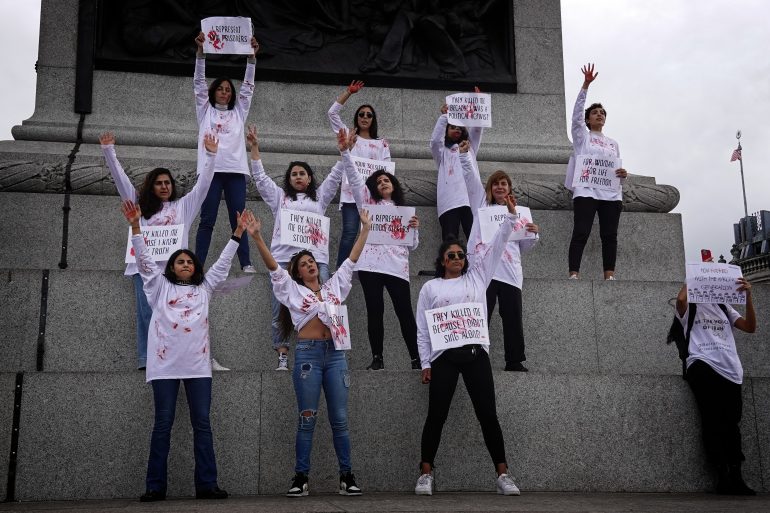A coalition of exiled opposition groups and figures from Iran has collapsed a year after protests challenging authorities emerged, leaving diaspora representatives searching for new ways to achieve long-sought unity.
Since the Islamic Revolution of 1979 ended the rule of the last shah, Mohammad Reza Pahlavi, Iranian exiles have been notorious for spending more time feuding among themselves than opposing Tehran’s theocratic leadership.
However, unprecedented protests sparked by the Sept. 16 death in custody of Jina [Mahsa] Amini, arrested for allegedly violating Iran’s Islamic dress code, created new momentum for creating a unified movement abroad.
In February, Reza Pahlavi, the son of the former shah, joined other figures often at odds to establish the Alliance for Democracy and Freedom in Iran (ADFI), a coalition that published a “Mahsa Charter” outlining a transition to secular democracy.
Key members included U.S.-based Pahlavi, Nobel Peace Prize laureate Shirin Ebadi, campaigner Masih Alinejad, Iranian-Kurdish figure Abdullah Mohtadi of the Komala party and activist Hamed Esmaeilion, who lost his wife and daughter when Iran shot down a Ukrainian airliner in 2020.
However, Esmaeilion announced barely a month after the group’s formation that he was leaving, criticizing “undemocratic methods” aimed at Pahlavi.
Ebadi, Alinejad and Mohtadi also left, stating that the “situation has made it difficult to continue our solidarity.”
As the first anniversary of Amini’s death approaches, hopes for unity have evaporated.
Factions and frictions
Arash Azizi, senior lecturer at Clemson University, said Pahlavi had struggled to reconcile his nationalist supporters with center-left figures like Alinejad and Esmaeilion, let alone Kurdish Mohtadi.
Azizi, author of the forthcoming book What Iranians Want: Women, Life, Freedom, said, “This speaks of a contradiction Pahlavi has long faced: while he advocates a broad liberal agenda, many in his base espouse aggressive chauvinistic politics.”
Both Pahlavi and Alinejad attended this year’s Munich Security Conference in February, highlighting the benefits of unity.
However, many diaspora members distrust Pahlavi, who has never distanced himself from his father’s authoritarian rule.
Outside the coalition was the People’s Mujahedin (MEK), an organized Iranian exile group opposed to Pahlavi and regarded with disdain by many for siding with Iraq in the 1980-1988 Iran-Iraq War.
Tensions within the coalition emerged over regional autonomy, with Pahlavi and his supporters opposed to decentralization favoring non-Persian minorities like the Kurds.
UK-based actor and campaigner Nazanin Boniadi lamented that “old rifts—left vs right, monarchist vs republican—widened and deepened” post-coalition.
“Ultimately, the opposition proved to be more fractious than the regime. As long as the regime is united, and we are divided, they will remain in power,” she wrote in an op-ed published by news site IranWire.
Kurdish opposition groups
Major Kurdish opposition groups in the Kurdistan Region saw an opportunity in the protests but that allowed Tehran to clamp down on these groups. Parties like Komala, the Democratic Party of Iranian Kurdistan (PDKI) and the Party for a Free Life in Kurdistan (PJAK) faced assaults, assassinations and a disarmament deadline. Rising internal divisions further weakened their positions, culminating in fatal clashes between two Komala factions in June.
A sobering moment
As Sept. 16 approaches, Pahlavi said he is committed to unity and called for new protests on that day. In a video message, he described the date as an “important opportunity” for Iranians to “unite and initiate a new wave of our national revolution.”
In an interview with French journal Politique Internationale, Pahlavi said his aim is to “unite the Iranian people around democratic and secular ideas,” rejecting any military intervention for regime change in Iran.
Azizi said the collapse of the ADFI was a “sobering moment,” especially as authorities have sought to strengthen their position through international diplomacy while increasing pressure at home.
“But as the anniversary of Mahsa’s death approaches, it is likely that some diaspora figures will rethink possible pathways to unity against the regime, perhaps starting from massive demos likely to be held on the day,” he said.


